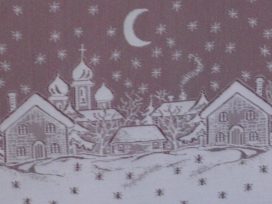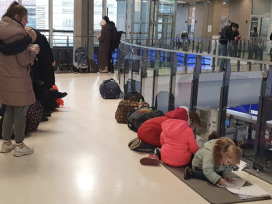
A leading Ukrainian-American writer on grace, justice, power and freedom.
What connects the familiar divine self-revelation, a passionate debate at a congress of European cultural periodicals and the silent demonstration against the latest assassination by ETA? Mihaly Des writes on personal identities and projections thereof.
“There is not such a thing as identity,” blustered the Belgrade philosopher in consternation and his grave and bellicose indignation seemed so authentically Balkan that for a moment I feared the eruption of an inter-ethnic, intellectual conflict. It all started when the Polish economist repudiated the social claims of the special correspondent of the mythic and eloquent New Left Review while setting out his own demands, which were unashamedly neo-liberal. And as if anything else was needed in such a permissive environment, he eulogised about something as reactionary, dead and buried as identity, in this case embodied in language.
Everyone pounced on him. The Serbian philosopher, as if he were a postmodernist Chetnik, asked him in a bellow if he had read the recent book by an intellectual American authority with an unpronounceable name, an irremediable refutation of the concept of identity. A Portuguese philosopher, more melancholy than a fado and more incisive than a union agitator, called attention to the fact that, in the era of globalisation, there is no sense in speaking of identity: capital has no identity, the same products are everywhere, and the great entities that manage the world are supranational…
Identities, entities, calamities… The small intellectual storm that I am recalling was unleashed in a recent meeting of more or less left-wing and liberal European cultural periodicals, brought together under the virtual banner of the new website Eurozine, where Spain was represented by Lateral, a Barcelona publication in Spanish and edited by a Hungarian. This event was held in a beautiful baroque palace of the capital of Slovakia, Bratislava, which, under the name of Pozsony, was for centuries the seat of the Hungarian diet and is known in German as Pressburg, a kind of suburb of the imperial Habsburg capital from which it is separated by some 50 kilometres. Thus, it is quite possible that today there is no point in speaking of identity but -because of history- this city has at least three.
Even more than cities, people also usually have various identities, of which the national, regional, provincial, local or community connection represents only one dimension.
There is, in addition, language, religion, sex, age, profession or social class, to pay tribute to a category even more disused than identity. The problem begins when one of these identities gains power over the others and exercises total dominance: devout faith becomes religious fundamentalism, social commitment becomes political fanaticism and love for one’s country becomes malicious chauvinism. Thus is born an easy, unequivocal and one-dimensional identity which does not permit any alternative, either for itself or for others.
A great deal of human thought revolves precisely around the issue of identity, specifically through the question: who am I? Such a reflection demands clarification of mankind’s other great spiritual preoccupation: what the hell am I doing here? In one of his few live acts, God reveals himself to Moses, first as an historical being (“I am the God of Abraham, of Isaac, of Jacob…”) and then, when he sees that this does not impress him, he goes metaphysical and offers him a divinely enigmatic response: “I am who I am,” which the familiar human simplicity often interprets as: what does it matter to you who I am? But it does matter, and even if you do not define yourself others do so for you.
The Pole Witold Gombrowicz sustained that identity does not exist because we are a projection of what is socially and individually expected of us and we act in accordance with expectations, even when we rebel against them, fulfilling the perfectly established role of those who rebel. And it is true: even if you do what you want, you are pigeon-holed -and quite wrongly.
In my former life, I belonged to the outer circles of the minuscule Hungarian opposition. Moreover, as a translator I was in contact with left-wing intellectuals of the West and the developing world. The two groups were people of the same stamp, right down to their clothes. They had very similar cultural tastes, they shared a sense of humour and a critical outlook, the same social sensitivity and the same line of weak and caustic argument. They were the same in other circumstances. But not in politics. I took time to understand that they were on the other side of the barricade. When, for example, we prayed that Spain would vote in favour of entry into NATO (which would have been, and was, a great help both in terms of politics and motivation), my Spanish counterparts, inevitably liberal, listened to my arguments in horror. However, when I spoke to my Hungarian, Polish, Czech or Cuban friends about the injustices in the developing world or about the right-wing dictatorships, they waxed ironic about my anti-imperialism and asserted that perennial communist totalitarianism had nothing to do with the ephemeral banana dictatorships.
When I landed in Spain in 1986 my identity was the object of permanent misunderstanding. For speaking ill of Communist regimes those close to me in all other respects considered that I was using the same arguments employed by Franco’s propaganda and, therefore, that I was a fascist. Although history has overcome the equation “criticism of communism equals an apology for fascism”, the misunderstandings do not cease. The local version of the new magical equation goes like this: “criticism of the concessions by the Basque National Party to the ETA assassins equals an apology for the Spanish government”. Immediately following our campaign against ETA, come voices and e-mails which accuse us of being of the Popular Party or in their pay. It is truly formidable! Six years of effort bordering on masochism editing this periodical and a campaign which is at least impartial and daring so that some patriot can come and say you are paid by those in power.
I was thinking about these things while walking in Barcelona among another 900,000 people who decided, under the consensus of absolute silence, to express their rejection of ETA following the assassination of the university professor and politician Ernest Lluch. It was the first demonstration of my lengthy life. Why now? Because the rejection of the terror spread by ETA is a moral obligation for all those who aspire to live in peace; because rejecting violence is a necessary act of self-defence, a gesture of freedom. Not exercising it means resigning oneself to terror. There was no necessity to be in agreement with ideological questions or political solutions -in fact, I do not sympathise with the nationalism of the victim- but only with a single ethical precept of great practical transcendence: stop the killing. I am who I am… One of the reasons I came to this country is that I had more than enough identities and connections. Barcelona came to be the appropriate place because, contrary to what is said, it is tolerant to the point of indifference. Nobody asked me for affiliations, nobody aspired to conquer my soul. And I was delighted to live here without feeling either Catalan or Spanish. The years went by. From starting the newspaper at the international pages I came to open it at the local section. From having all my memories there, I have also developed a past here. I have irreversible connections: family, children, friendships. But it was there in the demonstration, caught up in the majestic maritime silence of a million people, that I suddenly understood that I love this country and I (also) belong to it. I always fled from my identities and now it seems that I have two more. It is time for me to go.
Published 29 January 2001
Original in English
First published by Lateral
Contributed by Lateral © Mihály Dés / Lateral / Eurozine
PDF/PRINTSubscribe to know what’s worth thinking about.

A leading Ukrainian-American writer on grace, justice, power and freedom.

Remaining in a new country or returning home? The Knowledgeable Youth podcast delves into the complex decision-making refugees face when migrating, together with researcher Olena Yermakova.